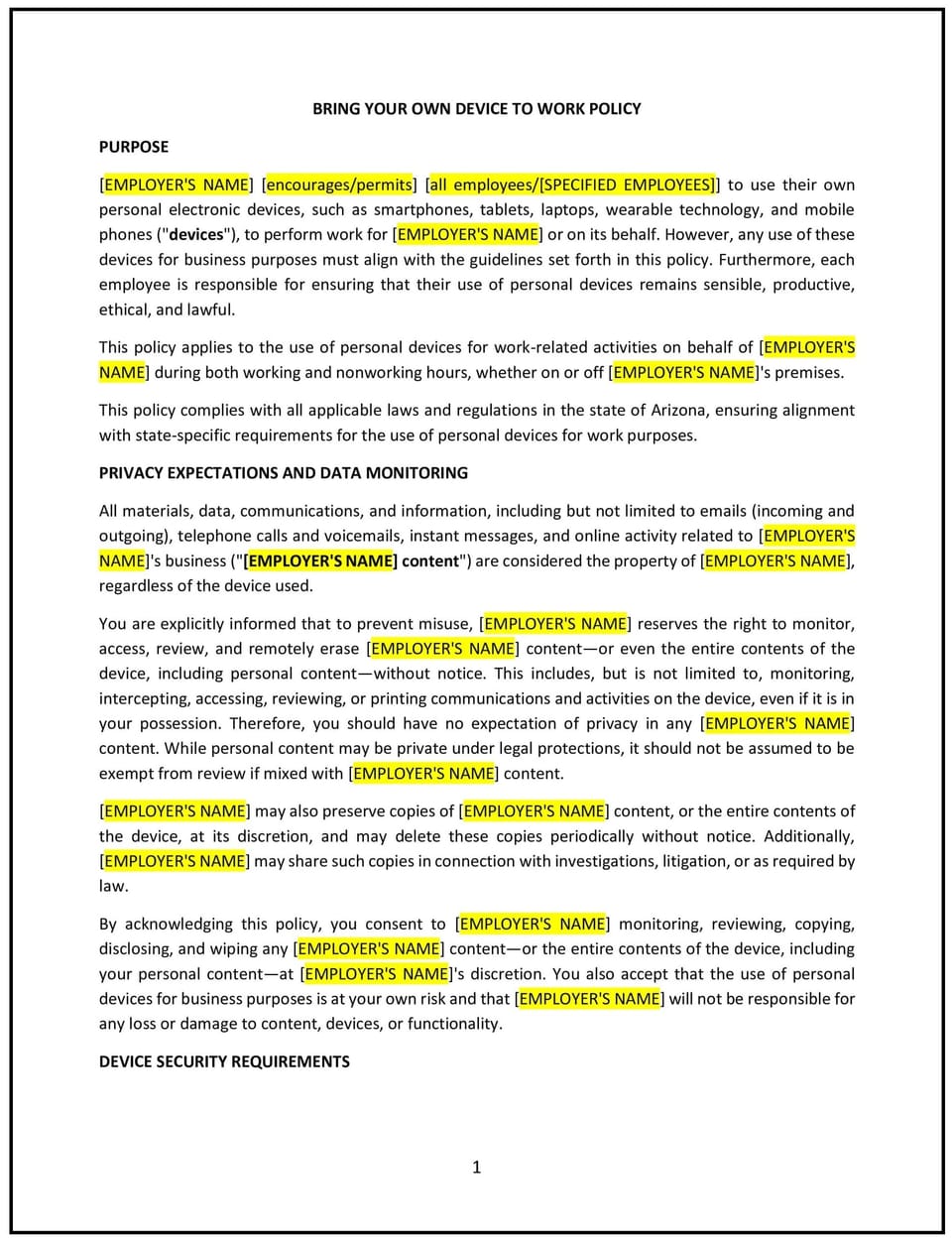Bring your own device to work policy (Arizona): Free template

Bring your own device to work policy (Arizona)
In Arizona, a bring your own device (BYOD) policy helps businesses manage the use of personal devices for work-related activities while protecting company data and ensuring compliance with privacy and security laws. This policy is particularly relevant in industries with remote or hybrid work models, as it allows flexibility while mitigating risks associated with personal device usage.
This policy outlines the guidelines for employees using personal devices such as laptops, smartphones, or tablets for work purposes. It includes security requirements, acceptable use provisions, and procedures for addressing breaches or other issues.
How to use this bring your own device to work policy (Arizona)
- Define acceptable use: Clearly outline the types of activities employees can perform on personal devices when accessing company systems, such as email, work platforms, or cloud storage.
- Set security requirements: Require employees to follow security protocols, such as using strong passwords, installing antivirus software, and enabling encryption on personal devices.
- Provide data protection measures: Include guidelines for protecting company data, such as avoiding public Wi-Fi for work purposes and enabling remote wipe capabilities in case of device loss.
- Address privacy concerns: Clarify the boundaries of what the company can and cannot access on personal devices, respecting employee privacy while protecting business interests.
- Establish exit procedures: Define how company data will be removed from personal devices when employees leave the organization or no longer use their devices for work.
Benefits of using a bring your own device to work policy (Arizona)
This policy provides several advantages for Arizona businesses:
- Enhances flexibility: Allows employees to use their own devices, promoting convenience and adaptability, especially for remote or hybrid work arrangements.
- Reduces costs: Lowers expenses related to purchasing and maintaining company-owned devices.
- Protects business data: Implements security measures to minimize the risk of data breaches or unauthorized access.
- Promotes consistency: Standardizes guidelines for personal device usage, reducing ambiguity and potential disputes.
- Supports compliance: Aligns with Arizona and federal data privacy and security requirements, protecting the business from legal risks.
Tips for using a bring your own device to work policy (Arizona)
- Address Arizona-specific considerations: Tailor the policy to reflect industry-specific needs, such as healthcare or tech, where data security is critical.
- Provide training: Educate employees on the policy, including how to meet security requirements and recognize potential threats like phishing scams.
- Use monitoring tools sparingly: If monitoring is necessary, ensure transparency and limit it to work-related activities to respect employee privacy.
- Regularly update the policy: Adapt the policy as technology, regulations, or business needs evolve to maintain effectiveness and relevance.
- Maintain compliance records: Document adherence to security measures and privacy standards to demonstrate compliance during audits or investigations.
Q: How does this policy benefit my business?
A: It enhances flexibility by allowing employees to use their own devices, reduces costs for equipment, and ensures company data is protected through standardized security measures.
Q: What security measures should be enforced under this policy?
A: Businesses should require encryption, strong passwords, antivirus software, and remote wipe capabilities to safeguard company data on personal devices.
Q: How can we handle data removal when an employee leaves the company?
A: Include procedures for securely wiping company data from personal devices, either through IT assistance or approved software, as part of the offboarding process.
Q: What industries in Arizona are most impacted by BYOD policies?
A: Industries like healthcare, tech, and education, where sensitive data is frequently accessed remotely, benefit the most from a robust BYOD policy.
Q: How can this policy ensure compliance with privacy laws?
A: By clearly defining acceptable use, outlining boundaries for company access, and implementing strong security protocols, the policy aligns with state and federal privacy regulations.
This article contains general legal information and does not contain legal advice. Cobrief is not a law firm or a substitute for an attorney or law firm. The law is complex and changes often. For legal advice, please ask a lawyer.


